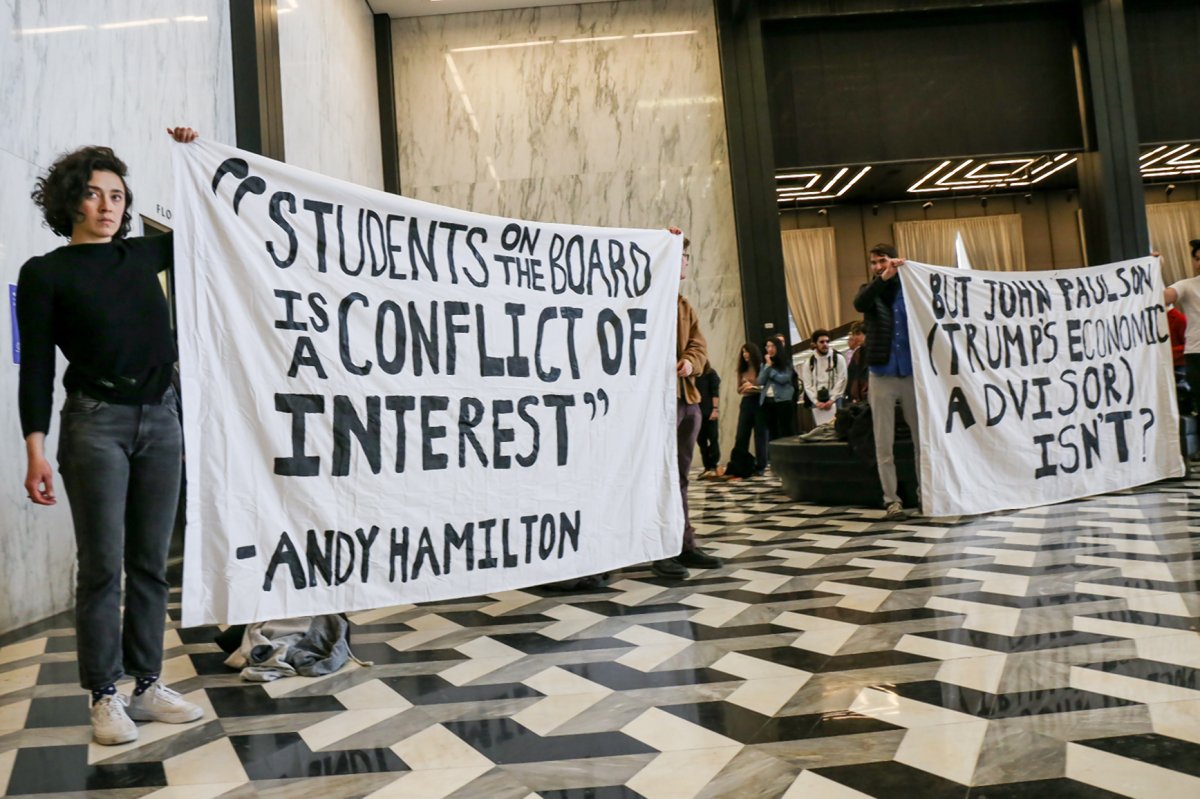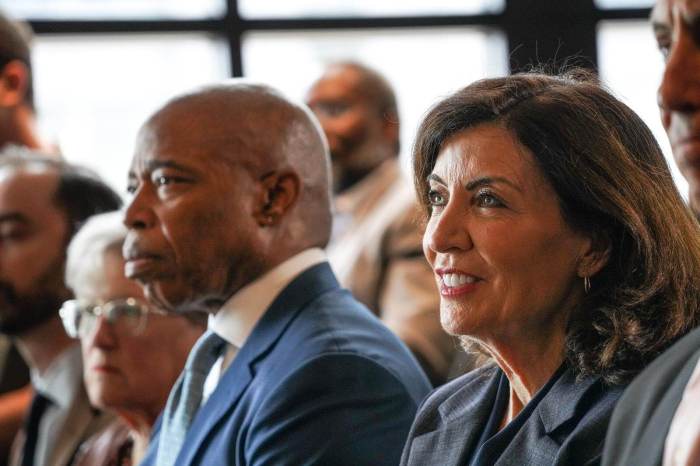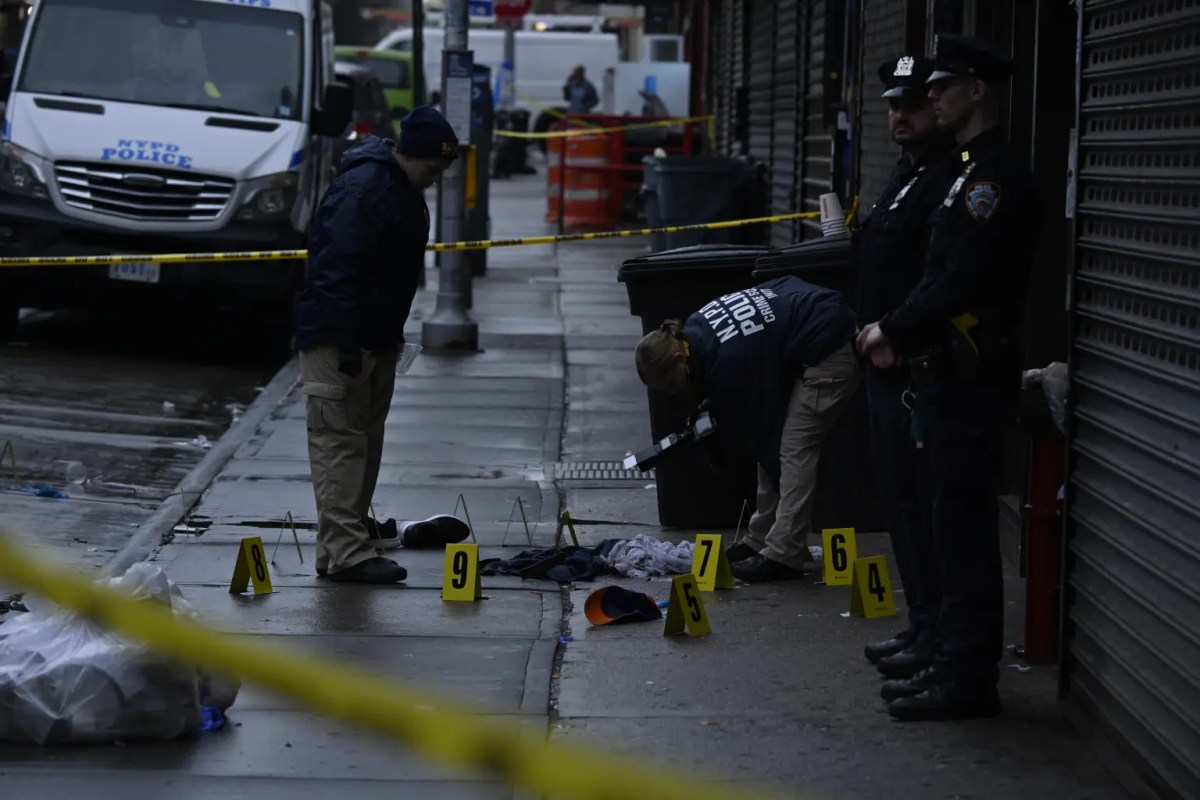
BY AMY RUSSO | New York University has long been seen as a haven for liberal-leaning students eager to learn in the diverse cultural hub of Greenwich Village. But a look at the school’s board of trustees paints a less-than-savory picture, in the view of some.
Aside from the lengthy list of the board’s monied members, trustees John Paulson and William Berkley, in particular, have drawn scrutiny from students who believe the two men’s values are not in line with N.Y.U.’s progressive reputation.
Members of the university’s Student Labor Action Movement, or SLAM, occupied the lobby of the N.Y.U. Bobst Library last Wednesday afternoon Feb. 2 for a sit-in to protest Paulson’s position on the board and its refusal to accept any student members. Students first gathered in Schwartz Plaza adjacent to the library, then entered the monolithic, Philip Johnson-designed edifice, unfurling painted protest banners near the administrative elevator and chanting for Paulson’s removal.
Hedge-fund manager Paulson raked in billions after betting on the housing market crash and has served on President Donald Trump’s economic policy team, causing outrage among students who feel the liberal image of their university has been tainted.
Stephanie Rountree, a protester and first-year student in N.Y.U.’s Gallatin School of Individualized Study, said that those who “felt that they were at a very liberal and welcoming school…needed to be aware that these forces are sort of pushing us in the wrong direction, and that our best interests are not at heart. And in order for them to be truly at heart, we need to make sure that we’re on the board making the decisions.”
Rountree has not been satisfied with the board of trustees’ roster or its reasons for denying students membership.
“A lot of the arguments that the board has made,” Rountree noted, “especially by our president, Andy Hamilton, is that students could not be objective in making decisions for the school, which we find hard to believe, given that our chairman of the board, William Berkley, made his fortune off of predatory student loans, which are often directed at N.Y.U. students.”
Berkley once served as lead director on the board of directors at the First Marblehead Corporation, a student-loan group that was subpoenaed for investigation by Governor Andrew Cuomo in 2007 during his tenure as New York’s attorney general. First Marblehead was one of dozens of companies probed back then to determine whether their marketing tactics were deceptive toward students.
“A lot of the values that are reflected in the decisions that the board makes…are inherently problematic, to say the least,” remarked protestor Kendra Pratt, a junior a Gallatin. Pratt believes the board needs major change.
“They’re affiliated with racist, homophobic agendas sometimes,” she said, adding, “The people that do represent this institution at the highest level are tied to such specific financial agendas — specific, corrupted financial agendas. I think that it’s backward that our university has perpetuated the investments that it has and the policies. So that’s why I’m here.”
Pratt noted a lack of transparency on the board of trustees — such as its failure to state information on its meeting locations and the list of attendees. Students believe the board meets about three times per year, but this estimate is unconfirmed because of a lack of public information. N.Y.U.’s Student Senate can communicate requests to the administration, which should, in turn, deliver these to the trustees. Yet no direct link exists between students and the board.
While SLAM members and other protesters insisted on a public meeting with university President Hamilton, the library lobby occupation ended roughly an hour and a half after it began once Marc Wais, N.Y.U.’s senior vice president for student affairs, arrived to negotiate with SLAM on their demands. Wais denied the group a public forum with Hamilton. Instead, SLAM was offered a private meeting between five of its delegates and Hamilton in the next two weeks, and the activist group was also welcomed to the university’s upcoming town hall meeting.
After word from Wais, SLAM member Katie Shane promptly addressed the protesters.
“They’re going to wish they’d just let us do what we wanted to do because now we’re just going to do it by force,” she warned.
Also following the sit-in, Drew Weber, a SLAM member who helped to organize the protest, vowed the group would keep pressing its point.
“We plan on making sure that the upcoming town hall at our university has the voices and our concerns front and center,” he said. “And we’re going to make sure that we don’t let the university off the hook in addressing this issue that’s proven important to a significant number of students at this university.”
University spokesperson John Beckman issued a statement to The Villager in response to the protesters’ demands.
“N.Y.U.’s position on the appointment of a student board member,” Beckman said, “is that it is both in line with peer institutions — roughly 80 percent of private universities don’t have a student board members — and with the position of the Association of Governing Boards, which recommends against student board members.
“The N.Y.U. board believes it is essential that its members bring a broad, wide-ranging and holistic perspective to their work, and appointing members to serve specifically as representatives of particular stakeholder groups is at odds with that principle. That position notwithstanding, student concerns such as these are important to the university and board, and we look forward to the upcoming occasions to exchange points of view.”
In addition to the makeup of its board of trustees, N.Y.U. has also come under fire for its investments. In 2014, reports released by the university revealed a $139 million investment in fossil fuels.

















